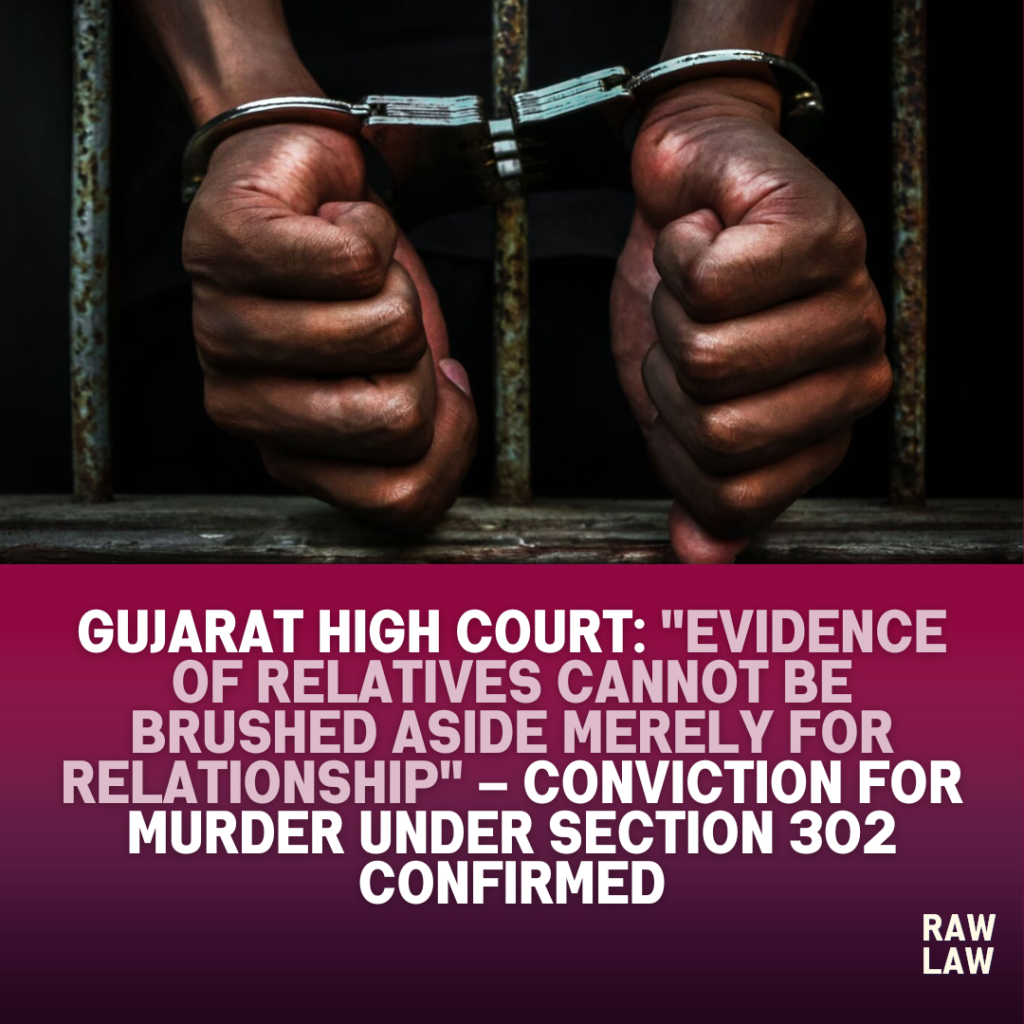Court’s Decision
The Gujarat High Court upheld the conviction of the accused under Section 302 of the Indian Penal Code, confirming the trial court’s judgment of life imprisonment. The Court held that the testimony of related witnesses cannot be discarded merely on the ground of relationship when it is otherwise credible and corroborated. The Court dismissed the appeal, ruling that there were no compelling reasons to interfere with the trial court’s findings.
Facts
The case arose out of a murder incident in which the accused allegedly assaulted the deceased with a weapon in broad daylight, leading to his death. The prosecution case was primarily based on the testimonies of relatives of the deceased who were eyewitnesses to the occurrence. The defence challenged the reliability of these witnesses, claiming that their testimonies were tainted due to their close relationship with the victim. The trial court, however, found the evidence trustworthy and convicted the accused under Section 302 IPC.
The accused appealed before the High Court, contending that the conviction was unsustainable as it rested solely upon partisan and interested witnesses.
Issues
- Whether the conviction under Section 302 IPC can be sustained when the prosecution’s case primarily rests on related witnesses?
- Whether the evidence presented was sufficient and credible to uphold the trial court’s finding of guilt?
Petitioner’s Arguments
The appellant-accused argued that the entire prosecution case was fabricated and motivated by enmity. It was contended that:
- All witnesses examined were close relatives of the deceased, and therefore, inherently biased.
- Independent witnesses were deliberately withheld, creating doubt over the veracity of the prosecution story.
- The trial court failed to appreciate contradictions and improvements in witness statements.
- In absence of reliable corroboration, conviction based on related witnesses alone was unjust.
Respondent’s Arguments
The State contended that:
- The presence of relatives as eyewitnesses was natural since the incident occurred in front of them.
- Their testimonies were consistent, cogent, and corroborated by medical and circumstantial evidence.
- The law does not treat related witnesses as unreliable per se, unless serious infirmities or contradictions are found.
- The trial court had rightly appreciated the evidence and returned a finding of guilt.
Analysis of the Law
The Court reiterated that the principle of appreciation of evidence does not allow discarding the testimony of a witness merely due to relationship with the victim. What is required is a careful scrutiny to ensure that the testimony inspires confidence. The Court emphasized that independent witnesses are not always available or necessary when related witnesses are found reliable.
The Court also examined the medical evidence which supported the ocular version of events. The chain of circumstances, including the recovery of the weapon and the motive established by the prosecution, reinforced the conclusion of guilt.
Precedent Analysis
The High Court relied on several Supreme Court decisions to affirm its view:
- Dalip Singh v. State of Punjab (AIR 1953 SC 364) – Held that testimony of related witnesses cannot be discarded solely due to relationship; it may be more dependable as relatives are less likely to spare the real culprit and falsely implicate an innocent person.
- Masalti v. State of Uttar Pradesh (AIR 1965 SC 202) – Affirmed that conviction can rest on related witnesses if evidence is found credible.
- State of Uttar Pradesh v. Krishna Master (2010) 12 SCC 324 – Clarified that minor contradictions or absence of independent witnesses do not undermine prosecution evidence if otherwise trustworthy.
By applying these precedents, the Court concluded that the prosecution evidence was legally sustainable.
Court’s Reasoning
The Court reasoned that:
- The incident took place in front of the relatives, making their testimony natural and probable.
- Their version was corroborated by medical findings, which aligned with the injuries described.
- No material contradictions or inconsistencies were found in cross-examination.
- The accused failed to establish any defence or provide an alternative explanation for the death.
Thus, the Court ruled that the trial court’s conviction was based on sound evidence and required no interference.
Conclusion
The Gujarat High Court dismissed the appeal and confirmed the conviction of the accused under Section 302 IPC. The Court reaffirmed the principle that evidence of relatives cannot be discarded merely because of their relationship with the deceased, so long as their testimony is credible, consistent, and corroborated.
Implications
This ruling reinforces the evidentiary principle that related witnesses are not inherently unreliable. Courts must assess the quality of testimony, not reject it outright due to relationship. The judgment provides clarity on the probative value of related witnesses in murder trials and strengthens the jurisprudence on appreciation of evidence in criminal law.
Cases Referred and Their Relevance
- Dalip Singh v. State of Punjab (1953) – Relationship does not discredit testimony.
- Masalti v. State of UP (1965) – Conviction valid on credible related witnesses.
- State of UP v. Krishna Master (2010) – Minor inconsistencies cannot nullify otherwise trustworthy evidence.
FAQs
Q1: Can a conviction be based solely on related witnesses?
Yes, courts have consistently held that the testimony of related witnesses can form the basis of conviction if it is credible, consistent, and corroborated.
Q2: What did the Gujarat High Court say about discarding relative witnesses?
The Court held that “evidence of relatives cannot be brushed aside merely for relationship” and must be evaluated on its intrinsic reliability.
Q3: Why was the appeal dismissed in this case?
The appeal was dismissed because the prosecution evidence, though primarily from relatives, was corroborated by medical findings and consistent with the circumstances, leaving no doubt about the accused’s guilt.



